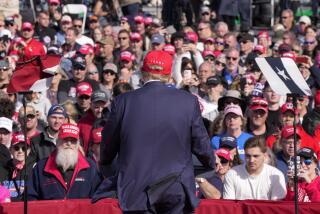History of Denials Opens Clinton to Skepticism
- Share via
WASHINGTON — When Gennifer Flowers announced in 1992 she had had a “12-year affair” with the Democratic candidate for president, Bill Clinton quickly issued a flat denial.
“It did not happen,” he told reporters in New Hampshire. “The allegation is false,” he told the millions of viewers of “60 Minutes.”
Asked by another interviewer whether he had “an intimate relationship” with Flowers, a hoarse Clinton nearly shouted his response. “Her story is not true. Gennifer Flowers’ story is not true,” he replied. “I’ve said it repeatedly. I have nothing else to say.”
A week ago, Clinton had something else to say when he was asked under oath whether he had had sex with Gennifer Flowers, as she had stated under oath.
Yes, he replied, according to those who are familiar with his testimony.
Asked about the various statements, a White House spokesman explained in background briefings that Clinton thought he had not lied earlier because he did not have a 12-year affair or an intimate relationship with Flowers. The spokesman noted that Clinton had admitted “causing pain” in his marriage.
The distinction is similar to many Clinton has made over the years as he appeared to give denials that later turned out to be shading the truth.
Also during the 1992 campaign, he famously replied to a question asking whether he had used marijuana by saying, “I did not inhale.” Accused of avoiding military service during the Vietnam War, Clinton replied, “I did not dodge the draft,” even though he used political connections to avoid being inducted into the armed forces.
*
Now, Clinton’s history is causing many to parse his statements carefully and skeptically.
On Wednesday, responding to the allegation that he had a sexual relationship with a young White House intern and then urged her and others to lie about it, the president quickly issued two apparently flat denials.
He said he did not have “any improper relationship” with Monica S. Lewinsky. “The relationship was not sexual,” he said. “I did not urge anyone to say anything that was untrue.”
But to some, his phrases about “improper relationships” and “sexual relationships” may have a limited meaning. A source who has listened to a portion of the Lewinsky tapes says Lewinsky reported that Clinton said he does not consider oral sex to be evidence of a relationship or a sexual affair.
At a meeting of state governors in the late 1980s, Clinton reportedly confided to fellow chief executives that, for a married man, oral sex with another woman did not constitute “adultery.” Two Arkansas state troopers also told The Times that Clinton had voiced the view that the Bible says oral sex with another woman is not adultery.
The president’s definitions may well be relevant here because a person who has heard portions of the tapes claims Lewinsky repeatedly describes her intimate relations with Clinton as ones involving oral sex only.
So the questions arise: Is Clinton using the phrase “improper relationship” to refer only to sexual intercourse, or perhaps a forced physical encounter?
*
As to allegations that Clinton urged Lewinsky to lie under oath about the relationship, his response that he did not “urge anyone to say anything that was untrue” sounds complete and categorical. On the tapes, however, Lewinsky says Clinton suggested she say nothing about their encounters.
Clinton is hardly the first president whose credibility has been questioned. Franklin D. Roosevelt, probably the most successful president of this century, considered himself something of a fox, with a sly ability to shade the truth when necessary.
But an erosion of the president’s credibility can threaten his ability to govern, as Presidents Lyndon B. Johnson and Richard Nixon learned in the late 1960s and early 1970s. Nixon’s lies and his attempt to cover up the truth about the Watergate affair ultimately drove him from office.
Until now, Clinton, a master politician, has been able to skate around his problem of credibility. Neither the press nor the public can require a politician to be absolutely honest about all matters, particularly personal ones.
However, a legal proceeding is different. A witness must swear to “tell the truth, the whole truth and nothing but the truth.” Lawyers can press the witness by asking different versions of the same question repeatedly. Evasive answers will not suffice. And lying under oath can subject the witness to a criminal charge of perjury.
Last Saturday, Clinton answered questions under oath for six hours with attorneys for Paula Corbin Jones. And soon he may face demands from the prosecutors working for Whitewater independent counsel Kenneth W. Starr to answer more questions under oath about his encounters with Lewinsky.
More to Read
Sign up for Essential California
The most important California stories and recommendations in your inbox every morning.
You may occasionally receive promotional content from the Los Angeles Times.














